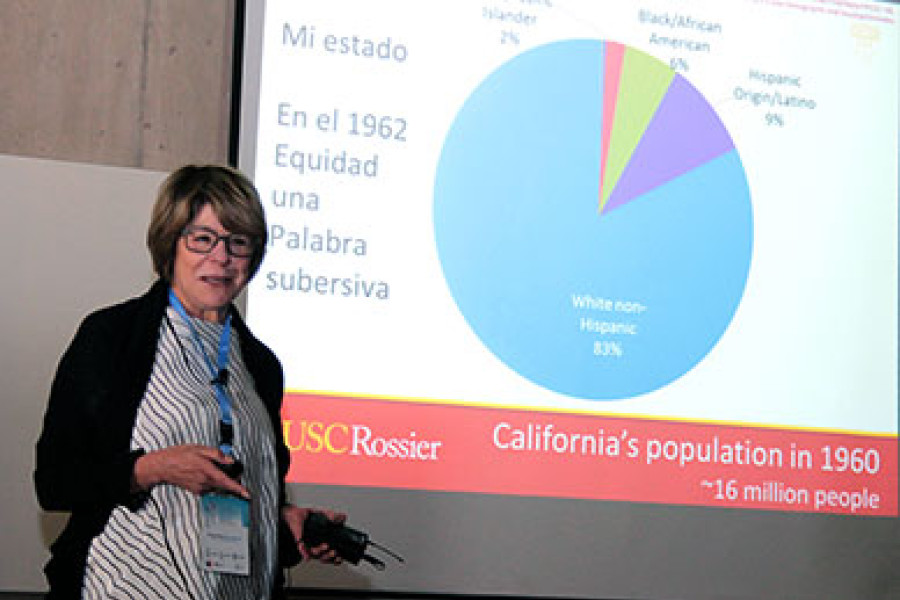The First Higher Education Inclusion Congress at our University gathered together international experts in this field, calling the attention of representatives of different universities, like professor and Co-director of the Center for Urban Education at the University of Southern California, Estela Mara Bensimon, who valued the “courage” that Universidad de Santiago de Chile has had to drive “transforming and exemplary” initiatives as the Propedéutico Program and the Grade Ranking, among others.
The activity sponsored by the Embassy of the United States in Chile included presentations and workshops and concluded with a plenary session at the Enrique Fröemel auditorium.
During this activity, Universidad de Santiago introduced its new inclusion initiative “Cupo Ranking 850” that will benefit “top one” students who take part in the Admission Process to Chilean Universities 2015.
With the purpose of promoting the development of innovative models for higher education access and retention and the generation of inclusive public policies that may be replicated in other universities, the First Higher Education Inclusion Congress was started at our University on November 06th.The activity organized by Fundación Équitas, Universidad de Chile, Universidad Diego Portales, Pontificia Universidad Católica de Chile, Universidad Católica de Temuco and Universidad de Santiago de Chile was held at the auditorium of the Department of Mathematics and concluded on November 07th. The program included presentations and workshops to promote equal opportunities.The Director of the Unesco Chair on Inclusion in Higher Education of Universidad de Santiago, Francisco Javier Gil, welcomed the international experts and representatives of different universities meeting at the congress and then described the goals of the activity to our institutional newsletter.“During these two days, we seek to strengthen the network of universities committed to inclusion and to promote it in those institutions that have not understood yet the importance of generating inclusive systems. We also aim to train new young professionals so that they continue with this task, because the challenge posed by inclusion in higher education will not be solved in one day,” he said.Professor Gil said that once this network of universities becomes consolidated, they will try to change the academic requirements that are currently used in the country to award scholarships, loans and other benefits. “Today, the Ministry of Education awards scholarships and loans considering the PSU admission test results only and this should not continue to happen,” he said.Regarding the high number of national and international institutions participating at this First Higher Education Inclusion Congress, Francisco Javier Gil showed himself very pleased and he specified that “inclusion should be a cross-cutting concern involving all universities, without distinctions.”Exemplary initiativesOne of the keynote speakers at the congress was professor and Co-director of the Center for Urban Education at the University of Southern California, Estela Mara Bensimon. After her presentation, she valued the “courage” that Universidad de Santiago de Chile has had to drive “transforming and exemplary” initiatives, like the Propedéutico Program and the Grade Ranking.“Universidad de Santiago has particularly done a transforming, revolutionary work regarding educational inclusion matters. In Chile and the United States, we need more initiatives, like promoting the Grade Ranking or the Propedéutico program experience of Universidad de Santiago,” she said, adding that “this university has become a model to follow for other institutions.”Universidad de Santiago’s leading roleAnother participant in this congress was Alberto Vásquez, Director of the Social Inclusion program of Pontificia Universidad Católica de Chile that has the purpose of implementing the new inclusion policy enacted at that institution a few weeks ago.“We expect to empirically demonstrate that the students’ entry to higher education through ways other than the regular system does not affect the academic quality of institutions; on the contrary, it contributes to better and more inclusive universities, Vásquez said.He added that he “has been aware for a long time of the experience and leading role of Universidad de Santiago regarding inclusion matters.”“This University has probably pioneered these matters in the country and I believe that it has persuaded all the other institutions to find ways to access higher education different from the PSU,” he concluded.For further information on the First Higher Education Inclusion Congress sponsored by the Ministry of Education and the Embassy of the United States in Chile, check http://fundacionequitas.org/congreso2014/Translated by Marcela Contreras


